Probiotics have become more popular for their health perks. These live microorganisms help your body and mind in many ways. They boost your digestion and immunity, making them key for a healthy diet. If you want to eat more probiotic-rich foods, you’re in the right place. This article will show you 10 tasty foods full of probiotics you can add to your meals and snacks.
Key Takeaways :Delicious Probiotic Foods
- Probiotics are live microorganisms that offer numerous health benefits when consumed.
- Consuming probiotic-rich foods, such as yogurt, kefir, and sauerkraut, can improve gut health and support overall wellbeing.
- Fermented foods like tempeh, natto, and kimchi are excellent sources of probiotics from around the world.
- Probiotic-containing beverages like kombucha and kvass provide a refreshing way to incorporate these beneficial bacteria into your diet.
- Dairy products like cheese and buttermilk also contain probiotics, making them a delicious addition to your probiotic-focused meals.
What are Probiotics and Why are They Important?
Probiotics are live microorganisms that are good for your health. They can make your digestion better, help with depression, support your heart, and boost your immune system. Some studies even show they can make your skin look better.
Understanding the Benefits of Probiotics
Probiotics are key to keeping your gut healthy. Each person’s gut has its own mix of microbes, but a healthy gut has many different kinds. Eating foods or taking supplements with probiotics can keep your gut diverse. This diversity is key for staying healthy.
The Role of Probiotics in Gut Health
- Probiotics help break down and digest food better.
- They can lessen inflammation in the gut, helping with symptoms of IBS.
- Probiotics make vitamins and nutrients for the gut lining.
- They fight off bad bacteria, keeping the gut balanced.
| Probiotic Benefits | Health Impacts |
|---|---|
| Improved Digestion | Better nutrient absorption, less bloating, and regular bowel movements |
| Boosted Immunity | Stronger resistance to infections and illnesses |
| Reduced Inflammation | Lessening symptoms of IBS, Crohn’s disease, and eczema |
| Enhanced Mental Health | Less depression and anxiety |
Using probiotics is a great way to boost your health. Adding more probiotic-rich foods to your diet can help you have a healthy gut. This can lead to many benefits from these good bacteria.
Yogurt and Kefir: Classic Probiotic Powerhouses
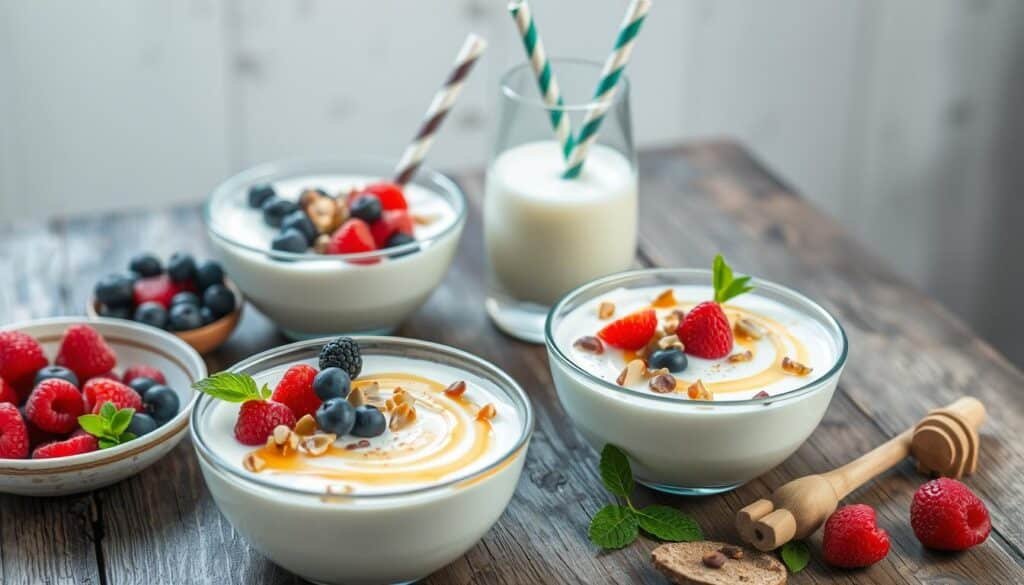
Yogurt is a top source of probiotics. It’s made by fermenting milk with good bacteria like lactic acid bacteria and bifidobacteria. Eating probiotic yogurt can help with bone and heart health, improve digestion, and lower the risk of diabetes and some cancers.
Kefir is another great source of probiotics. It’s a fermented milk drink with kefir grains in cow’s or goat’s milk. Kefir has many friendly bacteria and yeast, making it a stronger probiotic than yogurt. Drinking probiotic kefir can boost bone health, ease digestive problems, and fight infections.
| Probiotic Yogurt | Probiotic Kefir |
|---|---|
| Fermented milk product containing lactic acid bacteria and bifidobacteria | Fermented milk drink with a variety of beneficial bacteria and yeast |
| Linked to improved bone, heart, and gut health, as well as reduced risk of diabetes and cancer | Linked to better bone health, relief from digestive issues, and protection against infections |
| A classic source of probiotics | A more diverse and potent probiotic source compared to yogurt |
Probiotic yogurt and probiotic kefir are great for a balanced diet. They add lots of good bacteria to support health and well-being.
Delicious Probiotic Foods from Around the World
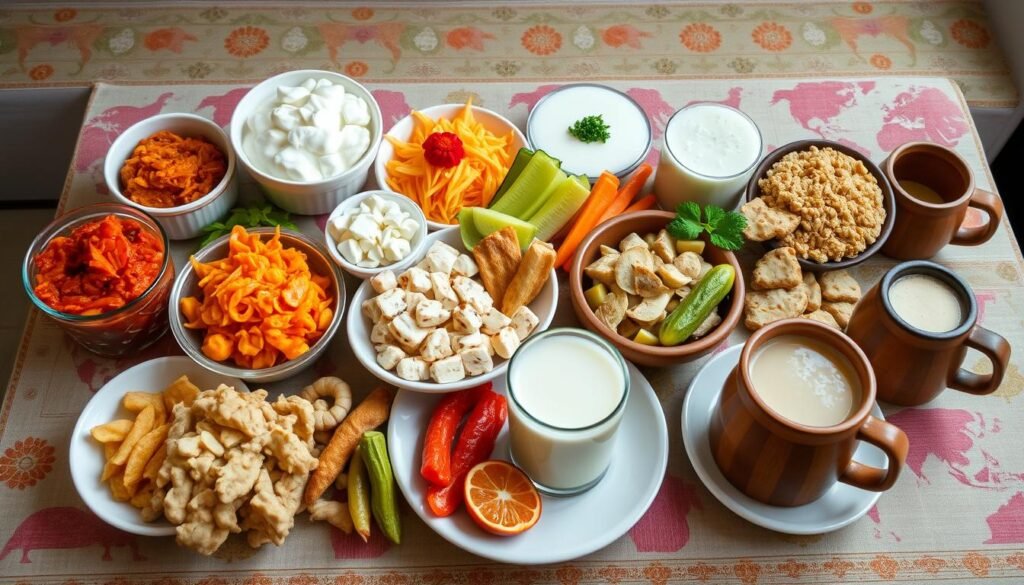
Yogurt and kefir are great for probiotics, but there’s more to explore. Let’s dive into some tasty international foods full of gut-friendly bacteria.
Sauerkraut: A German Favorite
Sauerkraut, a fermented cabbage dish, is loved in many places, especially in Eastern Europe. It’s packed with fiber, vitamins C and K, and antioxidants like lutein and zeaxanthin. The fermentation process creates lactic acid bacteria, making sauerkraut a top choice for gut health.
Tempeh and Natto: Fermented Soy Delights
In the East, we have two fermented soy foods full of probiotics. Tempeh is a protein-rich meat substitute from fermented soybeans. It’s lower in phytic acid, which can help with mineral absorption. Natto is another fermented soy product with Bacillus subtilis bacteria. It’s high in protein and vitamin K2, making it a great source of tempeh probiotics and natto probiotics.
Kimchi: Korea’s Spicy Probiotic Treat
Kimchi, the spicy Korean side dish, is a must-mention in probiotic foods. It’s made from fermented cabbage and veggies. Kimchi is a tasty way to get kimchi probiotics that can help your digestion.
From Germany to Korea, these international probiotic foods bring lots of flavors and health perks. Adding these foods to your diet can be a fun way to support your gut health.
Fermented Beverages: Sipping on Probiotics
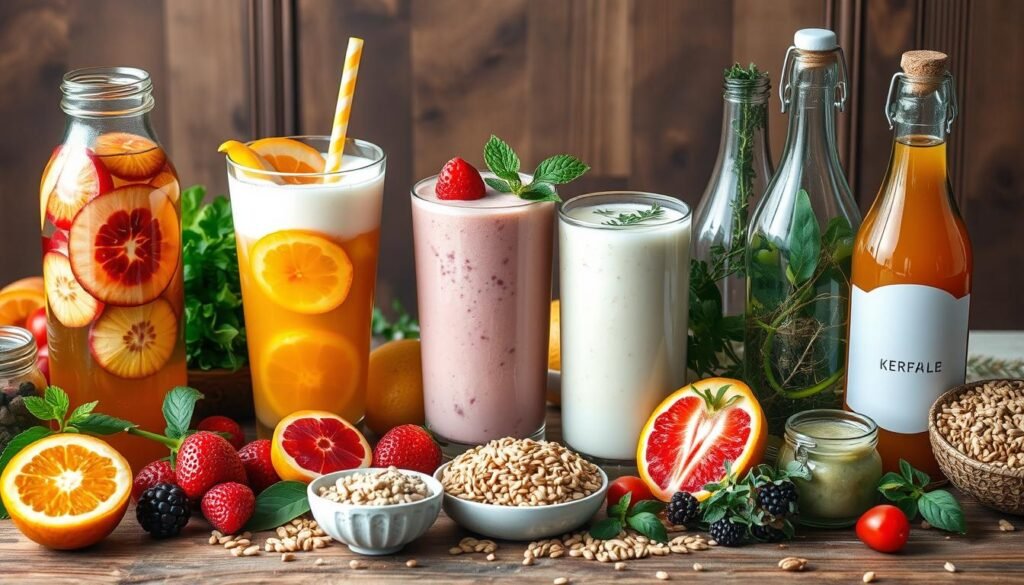
Probiotics aren’t just in solid foods. You can also find them in tasty fermented drinks. Kombucha and kvass are great examples. They make it easy to add probiotics to your diet.
Kombucha: A Fizzy Probiotic Drink
Kombucha is a fermented tea drink that’s popular around the world, especially in Asia. It’s fizzy and tangy, made by fermenting tea with SCOBY, a mix of bacteria and yeast. Studies show that kombucha probiotics might help lower the risk of cancer, diabetes, and other diseases.
Kvass: A Traditional Russian Delight
Kvass is a fermented drink from Eastern Europe, mainly Russia. It used to be made from rye or malt sourdough, but now it comes in many fruit and vegetable flavors. Like kvass probiotics, these fermented probiotic drinks are great for a healthy diet.
Kombucha and kvass show how fermented probiotic drinks can be tasty and easy to fit into your daily life. Whether you like the fizzy taste of kombucha or the traditional taste of kvass, these drinks are a fun and healthy choice for your gut health.
Probiotics in Your Favorite Dairy Products
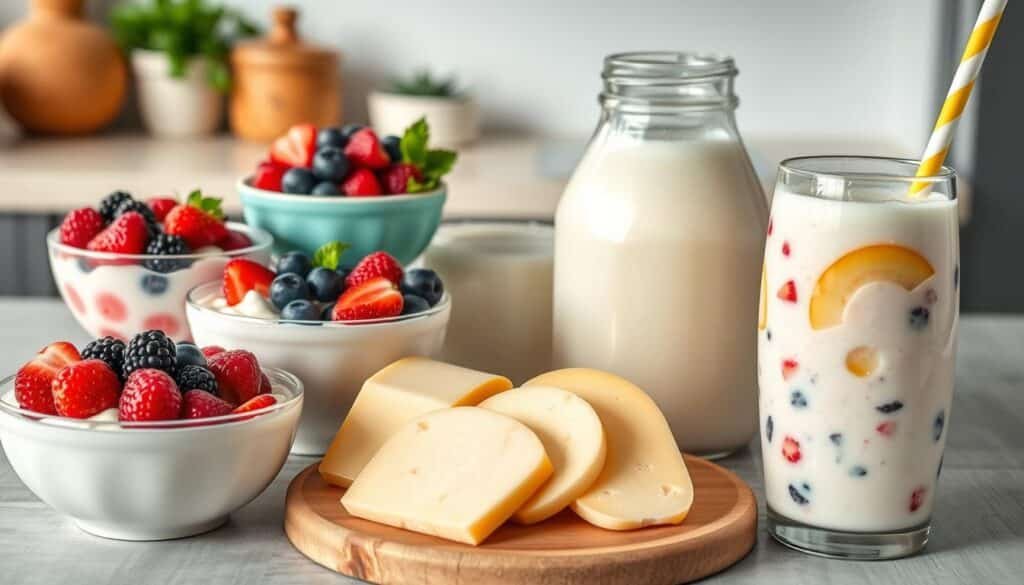
Dairy products are great for getting probiotics, which are good bacteria for your gut. Tangy buttermilk and tasty probiotic cheese are easy ways to add these beneficial microbes to your meals.
Cheese: A Delicious Source of Probiotics
Not all cheeses have probiotics, but some do. Look for “live cultures” or “active cultures” to get the most benefits. Cheeses like cheddar, mozzarella, and gouda have more probiotics than aged ones. Cottage cheese is also a good choice for probiotics.
Buttermilk: A Tangy Probiotic Treat
Traditional buttermilk is full of probiotics. It’s a tasty way to increase your probiotic intake. But, the buttermilk in American stores usually isn’t as good for probiotics as the traditional kind.
| Probiotic Dairy Product | Probiotic Strains | Health Benefits |
|---|---|---|
| Probiotic Cheese | Lactobacillus, Bifidobacterium | Improved gut health, enhanced immune function, reduced risk of infections |
| Probiotic Buttermilk | Lactococcus, Leuconostoc | Improved digestion, reduced cholesterol levels, better heart health |
Adding probiotic-rich dairy like cheese and traditional buttermilk to your meals is tasty and supports your health.
Probiotics in Other Fermented Foods
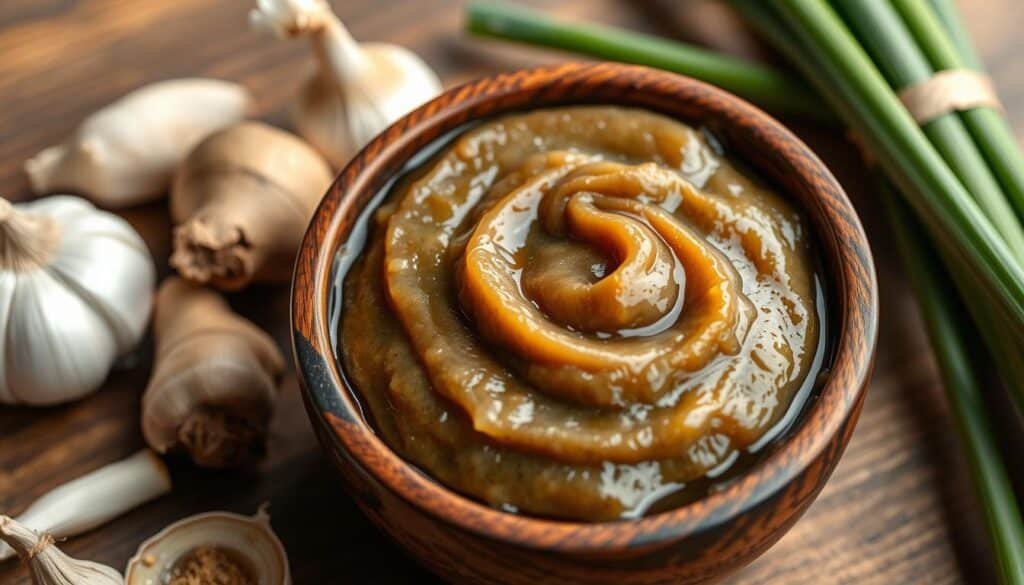
Beyond yogurt and kefir, fermented foods like miso and pickles are packed with probiotics. These foods are great for your health.
Miso: A Probiotic-Rich Japanese Seasoning
Miso is a key ingredient in Japanese cooking. It’s made by fermenting soybeans with salt and a fungus called koji. This process gives miso its unique taste and loads of probiotics.
Miso is full of protein, fiber, and vitamins like vitamin K and manganese. Eating miso can help fight cancer, obesity, and high blood pressure.
Pickles: Crunchy Probiotic Treats
Pickles, or gherkins, are a tasty way to get probiotics. They’re cucumbers that have been soaked in salt water to ferment. This makes them full of good bacteria.
Adding miso or pickles to your diet is a tasty way to improve your gut health. They’re great for anyone looking to eat more probiotic pickles.
Exploring foods like miso and pickles can make eating healthy fun. They’re a delicious way to get more probiotics into your meals.
Also Read : Unlocking The Secrets To Healthy Weight Gain
Conclusion: Embrace the Benefits of Probiotic Foods
Adding probiotic-rich foods to your meals can greatly improve your health. These foods are key to a healthy gut microbiome. This, in turn, boosts your digestion, immune system, and even your mood. Foods like yogurt, kefir, sauerkraut, and kimchi are great sources of these beneficial bacteria.
Choosing a probiotic-rich diet is easy and tasty. It’s a great way to keep your gut healthy and feel good overall. By trying new foods, you can find exciting flavors and learn about fermented foods. This makes adding probiotics to your diet a fun journey.
Start your journey to better gut health and wellness with probiotic foods. Enjoy their tangy, fizzy, and savory tastes. These foods can change your body and mind for the better.
FAQs
Q: What are some of the top probiotic foods to include in a healthy gut diet?
A: Some of the top probiotic foods include yogurt, kefir, sauerkraut, kimchi, miso, tempeh, and apple cider vinegar. These foods contain live cultures that can help improve digestive health and promote a happy gut.
Q: How does apple cider vinegar contribute to gut health?
A: Apple cider vinegar is known for its probiotic properties and can help support gut bacteria. It is made by adding specific strains of bacteria to fermented apple juice, which enhances its digestive health benefits.
Q: Can I incorporate probiotics into my diet through fermented vegetables?
A: Yes, fermented vegetables such as sauerkraut and kimchi are excellent sources of probiotic bacteria. These foods are beneficial for your health as they provide live and active cultures that support gut microbiota.
Q: What is miso, and how does it benefit digestive health?
A: Miso is a fermented soybean paste that contains live cultures. It is traditionally made by fermenting soybeans with specific bacteria, making it a good source of probiotics that can help improve digestive health.
Q: How do fermented dairy products like yogurt enhance gut bacteria?
A: Fermented dairy products, such as yogurt and buttermilk, are packed with live cultures and probiotic bacteria. They are considered some of the best probiotic foods for promoting a healthy gut and improving overall health.
Q: Is tempeh a good source of probiotics, and how is it made?
A: Yes, tempeh is a fermented soybean product that is a powerful probiotic. It is made by fermenting cooked soybeans with specific starter cultures, resulting in a product that is rich in beneficial bacteria.
Q: What role do prebiotics play in supporting probiotic effects?
A: Prebiotics are non-digestible fibers that feed the good bacteria in your gut. Including foods rich in prebiotics, such as garlic, onions, and bananas, can enhance the effectiveness of probiotics and improve overall digestive health.
Q: Are there any beverages that can be considered top probiotic foods?
A: Yes, drinks like kefir and kombucha, which are made from fermented milk and tea respectively, are excellent sources of probiotics. They contain live cultures that can benefit gut health and support immune health.
Q: How can I effectively include more probiotic foods in my diet?
A: You can include more probiotic foods in your diet by incorporating items like yogurt, kefir, miso soup, and fermented vegetables into your meals. Additionally, consider using apple cider vinegar in dressings or marinades to enhance flavor and probiotic content.
Source Links
- https://www.healthline.com/nutrition/11-super-healthy-probiotic-foods
- https://www.bbcgoodfood.com/health/health-conditions/top-probiotic-foods
- https://www.today.com/health/diet-fitness/probiotic-foods-rcna30830







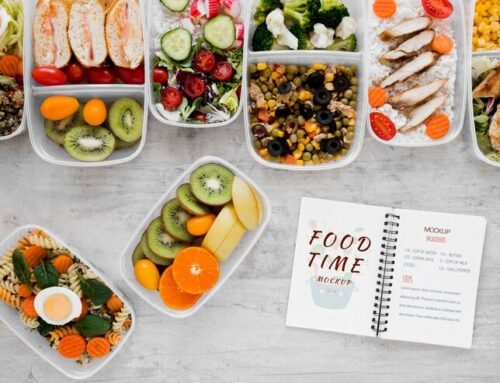
Leave A Comment